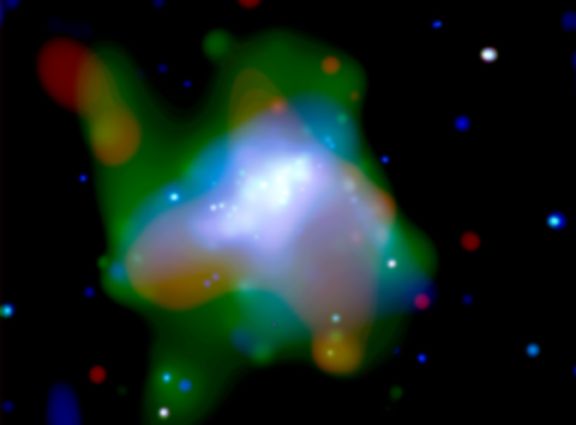NGC 1569: Heavy Elements from a Small Galaxy

Explanation:
For astronomers, elements other than
hydrogen and
helium
are sometimes considered to be simply "heavy elements".
It's understandable really, because even lumped all together
heavy elements make up an exceedingly small
fraction of the Universe.
Still, heavy elements can profoundly influence galaxy
and star formation ...
not to mention the formation of planets
and people.
In
this tantalizing
false-color x-ray image from the orbiting
Chandra
Observatory, small dwarf galaxy
NGC 1569 is
surrounded by
x-ray emitting
clouds of gas thousands of light-years
across.
The gas has
recently
been observed to contain significant
concentrations of astronomers' heavy elements such as oxygen, silicon,
and magnesium, supporting
the idea that dwarf galaxies,
the most common type of
galaxy in the Universe,
are largely responsible for heavy elements
in intergalactic space.
A mere 7 million light-years distant toward the
long-necked
constellation
Camelopardalis,
NGC 1569 has undergone a recent burst of
star formation and stellar
supernova explosions.
The furious
cosmic activity
has heated
the expanding gas clouds to temperatures of millions of degrees
while enriching them with
newly synthesized
heavy elements.
Authors & editors:
Robert Nemiroff
(MTU) &
Jerry Bonnell
(USRA)
NASA Web Site Statements, Warnings,
and Disclaimers
NASA Official: Jay Norris.
Specific
rights apply.
A service of:
LHEA at
NASA /
GSFC
& Michigan Tech. U.

